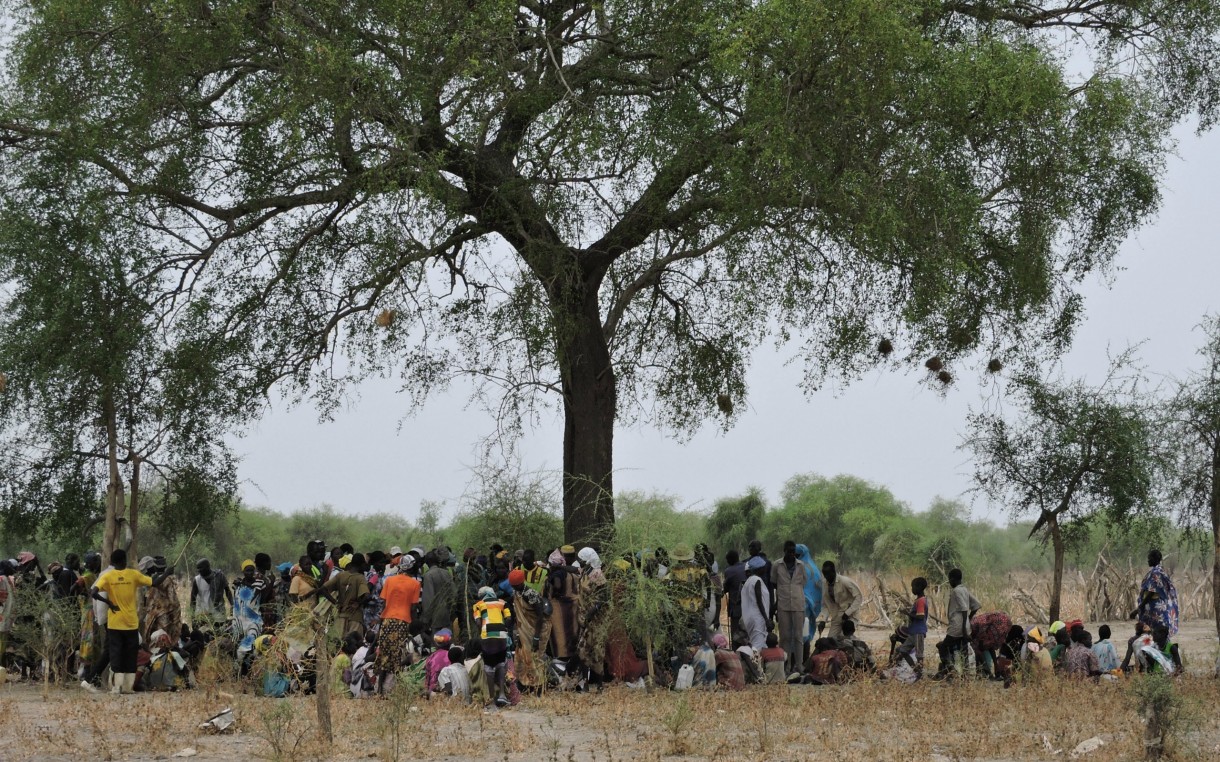South Sudan is a land of plenty. So why are 2.5 million of its people going hungry?
 It was a pleasure to photograph these three women, who were waiting in line at a food distribution in Jonglei, South Sudan. We had a good laugh about my awkward attempts to communicate. Like many parts of the country affected by the conflict, Jonglei is facing a serious food security crisis. Photo: Vanessa Parra/Oxfam America
It was a pleasure to photograph these three women, who were waiting in line at a food distribution in Jonglei, South Sudan. We had a good laugh about my awkward attempts to communicate. Like many parts of the country affected by the conflict, Jonglei is facing a serious food security crisis. Photo: Vanessa Parra/Oxfam America
As the rainy season approaches, peace is more essential than ever.
By Vanessa Parra, senior humanitarian media officer at Oxfam America.
A couple thousand feet from the ground on the propeller plane we’re in, heading to Jonglei state in South Sudan, what I find most striking are the miles and miles of lush green expanse. I’ve taken this route many times back and forth from Juba over several years of work on South Sudan and it never ceases to amaze me: the richness worth its weight in gold that could provide enough sustenance to feed everyone in South Sudan.
And this is still the dry season. In a couple of weeks roads will be impassable and this land will largely be underwater–flooding that provides nutrients and strength to the soil for another planting season.
But there hasn’t been much of that in South Sudan this year, not with the fighting going on and more than a million people displaced from their homes. There is no peace in South Sudan right now and it shows.
It is the greatest shame that a country this lush, this rich in resources, should be facing a food crisis. There are already 2.5 million people facing severe levels of hunger—that number is expected to go up by a staggering million people by June. This translates into families who are worried about where their next meal will come from, how they’ll find clean water, whether they will be safe from violence, and unsure of what will be around the corner.
Imagine not being able to tell your kids how much or if they’ll eat this week, and the next, and then the week after that. That they might not be able to go to school because it would be unsafe, a much-need opportunity for education unavailable to them for the time being.
We land in Lankien and head to Pultruk where there is a food distribution going on. Earlier, planes dropped thousands of bundles of emergency food supplies like sorghum, oil, and salt. Now Oxfam staffers are distributing the bundles to displaced people in areas of great need.

Some of the people here today walked up to 8 miles to get enough food to last them 15 days. They’ll have to come back for the next round of aid in a few short weeks, but until then they’ll have something to eat, and thanks to agencies like Oxfam, clean water to drink.
Driven from their homes by conflict, these families make do thanks to their neighbors—people who have taken them in, shared their food and their homes. And they strive to find their feet again, to possibly farm, or make a living in some other way despite all of the chaos around them.
I’m struck by the kids running around, playing with their toys, behaving like kids do anywhere else. The women in line, waiting to get their food, are chatting and laughing, sharing news. And when you ask them their stories, no matter how grim, they are open, kind, and incredibly brave.
The refrain we heard from the displaced people in Pultruk and around South Sudan is that peace is what this country needs. Without it there is no safe space, no easy way to plant without fear of being driven from their homes, no real security.
We need peace now, especially ahead of the rains in May that will make providing food aid incredibly difficult and expensive. And as the limited food stocks run out, the need for humanitarian aid only increases. When you hear aid workers sound the alarm, this is what they worry about, and why they are running around now getting ready for what’s to come.
But all is not lost. There are people eager to rebuild, who seek peace, who want to return to their homes and their lives. There are families helping each other out with food and shelter and what little they have. There is a sense of family and community wherever you turn. And aid efforts have helped stave off a famine at least so far. People need our help, but they also have each other. And, if nothing else, this sense of what’s possible in South Sudan gives me hope.
Oxfam is reaching people with emergency food, clean water and sanitation services, and other essentials. But to keep pace with the demands of this emergency, we urgently need your support to help protect lives. Donate now